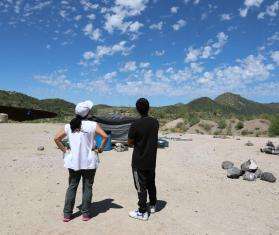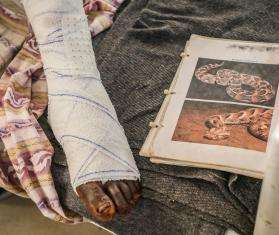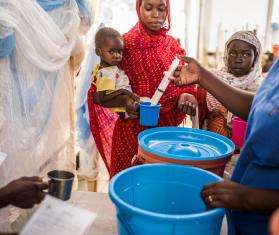In the eastern African country of Malawi, Doctors Without Borders/Médecins Sans Frontières (MSF) teams are working with community-based organizations to improve access to health care for sex workers, including through trained peers who provide advice, support, and help us respond as effectively as possible to their medical needs.
The towns of Dedza and Zalewa lie along the main trade route cutting through Malawi, used by trucks on their way from Tanzania to Mozambique. Many people in these towns—mainly women—make a living through sex work.
Some have turned to sex work due to a lack of support, resources, or professional training, or have experienced difficult family situations and traumatic life events. Others have lost parents or have been left by their husbands, leaving them alone and destitute; while others have suffered sexual abuse, including incest, and exclusion from their communities. Isolation and financial hardship make sex workers and their children extremely vulnerable in terms of health and safety.

Turning to sex work to overcome hardships
Hamida*, 29, used to run a vegetable and charcoal business in Mangochi, further north. When her husband left her for another woman four years ago, she was no longer able to provide for her family. “I started in 2020 to support my three children and four brothers and sisters,” she says. “Every month I send them money, but it's never enough. I often go to bed with an empty stomach.”
Agnes* is 42 years old. She has been working as a sex worker since 2008, when her husband died, leaving her four children and two grandchildren. She is the founder of one of two community-based sex workers' organizations supported by MSF.
"Every day, I generally have two or three clients and I earn around 6,000 kwacha [about $3.50],” she says. “The worst thing about this job is having sex with men and them not paying. This happens very often. Other times, the customers beat us up and steal from us.”

Most of the sex workers MSF teams support have difficulty accessing health care due to their precarious situation and the stigma to which they are subjected, including from “unwanted pregnancies; unsafe abortions that can lead to serious complications or even death; a high prevalence of sexually transmitted infections, particularly HIV; and often, injuries caused by clients," explains Charlie Masiku, MSF project coordinator for community-based organizations in Malawi.
Through six years of providing direct support, MSF teams have helped sex workers in Dedza and Zalewa form community organizations, develop skills, and feel empowered to access to health care. Trained sex workers work as peers to carry out health promotion initiatives on topics including safe sex practices and contraception as well as to provide support in the fight against sexual violence and help prevent sexually transmitted infections.

Peer support from other sex workers
At the heart of their approach are shared experiences. For example, peers provide information on pre-exposure prophylaxis (PrEP), a treatment to prevent HIV transmission, and provide training on screening for HIV and human papillomavirus, which causes cervical cancer. For the latter, the peers travel door to door to visit other sex workers and collect samples to send to a lab for testing.
Every other week, an MSF team consisting of a nurse, a health promoter, and a psychologist visit certain locations to provide more in-depth medical support. “Sometimes we refer women to hospitals for health problems that can't be treated by our teams or in local health centers, but they can't afford to go to a hospital two hours from home," adds Masiku. “So we meet young women with very advanced health problems.”

Progress has been made, but challenges persist for sex workers
In recent years, the economic situation and work environment has steadily deteriorated for sex workers. Inflation is rising, and the local currency has been devalued. Sex workers are facing increasing abuse by customers, and with transaction prices falling, many have to take more customers each day.
"Capacity-building in the field of health is very important and a step in the right direction,” explains Masiku. “However, these women also need to receive economic and social support from other organizations to enable them and their children to get out of this situation.”
Agnès, whose 23-year-old daughter has also become a sex worker, confirms: "I suffer a lot to find food for the girls and uniforms for school. But it's very difficult to stop because if I stop now, what am I going to do to earn money?"
Since the beginning of the year, MSF teams have been trying to establish links with local organizations that could help pay children's school fees or help women develop professional skills that would enable them to obtain other sources of income, such as by growing and selling fruit and vegetables, making soap, or raising livestock. This is crucial to making a difference to women's health and lives in the long term.
Since 2022, more than 1,800 women have benefited from sexual and reproductive health services, mental health support, health promotion, and treatment.
*Names changed to protect privacy




